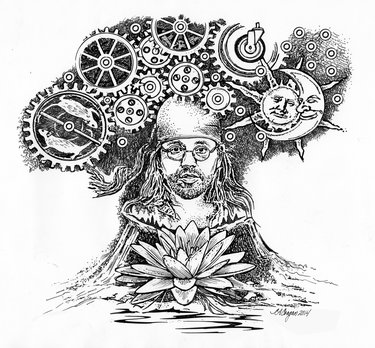Commencement speeches, a blind look to the future
The repetitive regurgitation of commencement-speech clichés, platitudes, and adages was put in the spotlight in 2005 — fittingly enough, in a commencement speech at Kenyon College given by writer David Foster Wallace.
Wallace, whose magnum opus and best-known work, Infinite Jest, is 1,079 pages long, began his speech with what he deemed a “didactic little parable-ish” story, which is a commencement speech staple.
The story Wallace employs goes as follows:
“There are these two young fish swimming along and they happen to meet an older fish swimming the other way, who nods at them and says, ‘Morning, boys. How’s the water?’ And the two young fish swim on for a bit, and then eventually one of them looks over at the other and goes, ‘What the hell is water?’”
What is important about the story, for our purposes, is not its content, but how Wallace uses it to get across his point.
The commencement-speech genre, he submits, is full of “teaching you how to think” vernacular, and he posits that what is more essential is learning what to think about and how you interpret the world around you.
In essence, this is the object of his speech. However, in expressing this seemingly simple yet powerful idea, Wallace painstakingly describes some of the most banal and possibly irritating parts of adult life: traffic, long lines, crowded and hot grocery stores, et cetera. These are things that are an inherent part of adulthood by virtue of having to take care of yourself.
Commencement speeches, at any occasion, tend to be congratulatory and contain some sort of lesson for going forward.
Wallace’s speech, by contrast, reveals what at least a part of life after graduation will be like outside the successful careers everyone is sure to obtain.
Being able to handle the trite, repetitive realities of the “adult world” isn’t just reserved for college graduates entering the work force, though. Many high school grads are going away to college, some of them very far from home, to live at least somewhat independently. And a set of them are going to be forced to do many life-maintenance things for themselves for the first time — cooking, cleaning, laundry, and the like.
Typically, these quirks of not living with your parents are mentioned in breaths of excitement about independence and being able to do “what I want, when I want.”
And, while nobody wants to kill the mood, maybe it would be in the best interest of all the kids on their way to being adults to inform them about some of the less exciting parts of life that, some days, feel like the essence of your existence.
A valid initial reaction to this thought may be that this is a cruel idea that will sap the hope and delight from the hearts of graduates the world over. Or that “life is about learning” and lessons are only truly absorbed when experienced — they fall flat when spoon-fed to us.
But, at each ceremony that occurs, a speaker is apt to throw bland life-advice bits at graduates like confetti. Why not be just a little more honest than advising people to “be themselves,” “love one another,” “try new things,” and the ever-pervasive encouragement that “you can accomplish anything if you try hard enough?”
Because, at the end of the day, these things aren’t always true, nor are they at the forefront of your daily routine.
Yes, it is important to maintain your individuality, and be nice to others, and be a good person, and have new experiences. But, it is not always true, or even close to true, that unyielding effort and passion will grant you the life of your dreams.
At least not initially.
Nobody can guarantee you that anything is going to pan out the way you’d like it to, despite your years of academic preparation. Struggles, however, are guaranteed. And maybe it’s not such a bad idea that, amid all the hugging, back-patting, and teary-eyed goodbyes, that someone taps you on the shoulder and says, “Enjoy it while it lasts.”
It’s odd that kids are given the impression that high school is a big, scary place that will swallow them up — both socially and academically. But when it comes to college, the attitude is one of eagerness and enthusiasm, sprinkled with perhaps a little trepidation about what it will be like to be “on your own.”
But nobody lets you in on the fact that many people who breezed through high school struggle in college. Or that maybe being away from home is scarier than you thought it would be. Or how easy it is to get lost on a campus full of old, brick buildings and labyrinthine sidewalks.
Commencement speeches, given on a happy occasion, celebrate the accomplishments of graduates and welcome them with open arms into a world that doesn’t always welcome them back.
Transitioning into a different stage of life merits recognition to be sure, but perhaps, as students step off the stage, diplomas in hand, someone could slip a note between the heavy binding holding their most prized piece of paper that represents all the late-night test cramming, notecard flashing, study-hall napping, relationship making and breaking that have gone into their last 12 years.
After all the photos, hugs, and tears, when they are settled back into their rooms where they wrote essays and equations, they will open the vinyl folder that squeaks and crinkles the way only vinyl can, and atop their diploma, a note will say:
“Hey, you did well, but you can’t stop now. Things are going to be hard. At the very least, they will be boring and annoying. But sometimes, in the moments between the banality and stress of adulthood, you’ll find something beautiful. Cling to it.”


